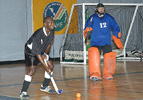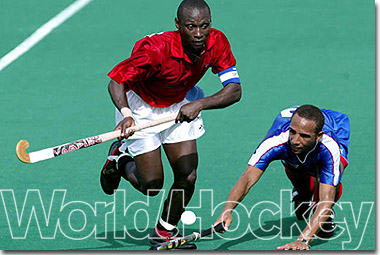If your choice was arguing legal matters or pressing the case for why your countrymen should ignore their passion for cricket, football and running to take up a hockey stick, which would you choose?
Usually the story line is: hockey player ends career with university degree, goes off to make good in business, returns for veterans hockey and inevitably becomes as an administrator. Kwandwane Browne, the Trinidad & Tobago captain who commanded attention with his smooth-moving play out of defence at the Commonwealth Games in Melbourne, intends to buck the trend. He has his legal degree from his studies in England, and is waiting on the results of his bar exam, but is putting law on hold to develop hockey on his Caribbean island. "My parents said I had to have something to fall back on," declared the 28-year-old Browne. "But the legal stuff can wait until I am 40 or 50. For now I want to play and coach hockey - all day, every day. I love the game and I want to give something back. My wife and my two children have no problem with it." Browne, who played at English clubs Southgate, Canterbury and East Grinstead and had a season in the hockey hotbed of The Netherlands while studying law at the London Metropolitan University, has returned to Trinidad & Tobago as its national technical director. It is his dream to have his countrymen, who are noted for their love of cricket, running fast on Olympic tracks and now playing at football's World Cup, taking up hockey sticks in schools and carrying them to the big-time tournaments Trinidad & Tobago so far has not reached. It is the same dream Browne has lived out since he first played hockey when four. "I've dedicated my whole life to hockey," says Browne, who at 13 was selected in Trinidad & Tobago's under 21 side and at 18 was playing on the international stage. "I've come back home because I love the game and want it to be loved in Trinidad & Tobago." The vision is grand, but its unfolding is not so easy. Browne wants to invest in junior hockey so that Trinidad & Tobago has under 14, under 16 and under 18 teams creating a pathway to its national under 21 and senior line-ups. And so that there are more than 30 players to choose from for international competition. But for now the money that would make this development program work in Trinidad & Tobago has to be devoted to the national team, to increase exposure, tantalise sponsors and establish role models for young players. "It is tricky," says Browne. "You need the national team doing well first, then the sponsors come and then you can develop young players. If only we had more to be able to do the junior development and promote the senior team at the same time." All of Trinidad & Tobago's matches at the Commonwealth Games were televised live from Melbourne to the Caribbean. At times it made a good impression for the folks back home. "We were uncomfortable playing 70 minutes of consistent hockey because we were not dealing with the pressure from the start, but look at our second halves and they were always better," said Browne. "We're not good enough to win these games, but we can be good enough at times to make them close games." Beyond exposing Trinidad & Tobago to better international hockey and television coverage at home, the trip to Australia also opened doors for Browne to learn of the Australians' coaching and development programs. He is hoping to return to Perth to play a season around the well-known Australian Institute of Sport campus. It could spark the foundation for a similar arrangement in Port of Spain from where any hockey player with talent is sent to England to develop his game. There are currently eight, all making use of the connections Browne set up for scholarships at the London Metropolitan University. "I like how Australia does it, they are the best in the world and there is plenty to learn here to take back home," says Browne.  | ||||||
| ||||||

 Trinidad and Tobago captain Kwandwane Browne has these options and has chosen hockey ahead of wearing silk. Adelaide based journalist Michelangelo Rucci meets the man on a mission.
Trinidad and Tobago captain Kwandwane Browne has these options and has chosen hockey ahead of wearing silk. Adelaide based journalist Michelangelo Rucci meets the man on a mission.

